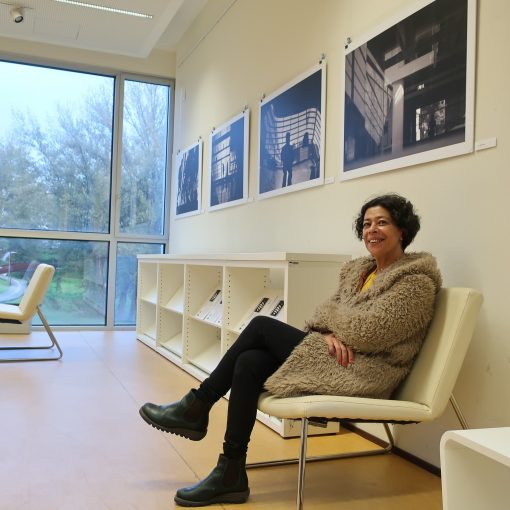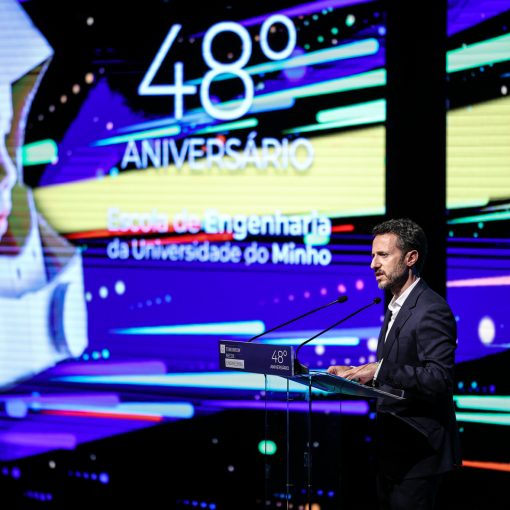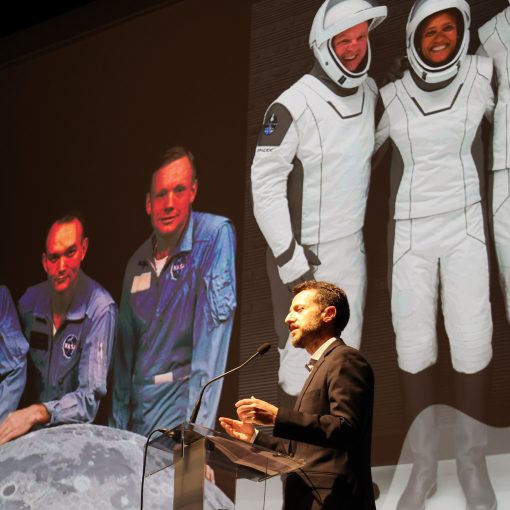 In the 3rd edition of “Engenharia: Falar é Fácil?”, a science communication event organised by the School of Engineering of UMinho, we challenged three teachers and researchers from EEUM to communicate a concept related to their area of knowledge to two different audiences: third cycle of basic education students, aged between 12 and 15, and secondary school students aged between 15 and 18.
In the 3rd edition of “Engenharia: Falar é Fácil?”, a science communication event organised by the School of Engineering of UMinho, we challenged three teachers and researchers from EEUM to communicate a concept related to their area of knowledge to two different audiences: third cycle of basic education students, aged between 12 and 15, and secondary school students aged between 15 and 18.
We challenged Henrique Santos, professor at the Information Systems Department of EEUM, to talk about “Internet of Things” to Pedro Balau, 8th grade student at Escola EB 2,3 André Soares and Mariana Gören, 11th grade student at Escola Secundária D. Maria II.
Henrique Santos is an associate professor with aggregation of the Information Systems Department of EEUM, where he teaches since 1985, and is also, since then, a researcher at the ALGORITMI Center in the areas of Information Systems Security, Biometric Technologies in authentication, Intrusion Detection in Computer Networks and Information Technologies for teaching. He founded and chairs, since 2016, the Portuguese Association for Data Protection, and integrates a working group on Security in the Information Society and another on Risk Management in Cyber Security. In 2017 he was the basis for the creation of a partnership between UMinho and the company DigitalSign, for the creation of the first laboratory dedicated to information security in smart cities oriented to students, LabSecIoT.
Lígia Rodrigues, professor at the Department of Biological Engineering of EEUM, was challenged to talk about “invisible friends”, such as bacteria and fungi, to Pedro Jorge Costa, 8th grade student at Escola EB 2,3 André Soares and to Rogério Marques, 11th grade student at Escola Secundária D. Maria II.
Lígia Rodrigues is associate professor with habilitation, director of the Department of Biological Engineering and deputy director of the Centre of Biological Engineering of the School of Engineering of UMinho. She is responsible for the sub-group of research in Synthetic Biology within the BioSystems group of CEB. Her research focuses on the use of synthetic biology approaches to design and build new microbial cell factories for the sustainable production of value-added compounds (e.g. prebiotics, biosurfactants, chemicals). It has raised several research grants and research contracts with industry. Published over 140 articles in international peer-reviewed journals, 30 book chapters and 10 articles at international conferences (index h 42). She has been involved in the creation of several spin-off companies in the areas of Biotechnology and Life Sciences. She is a member of the Scientific Committee of the BBI-JU (Bio-Based Industries Joint Undertaking) and a member of the College of Chemical and Biological Engineering of the Order of Engineers, Northern Region.
Finally, we ask Filomena Soares, professor at the Department of Industrial Electronics at EEUM, to talk about “Control Systems”, to João Ferreira, 7th grade student at Escola Básica 2/3 Egas Moniz and to Pedro Freitas, 1st grade student at the Integrated Master in Industrial Engineering and Management at the School of Engineering of UMinho.
Filomena Soares is associate professor with aggregation in the Department of Industrial Electronics of the School of Engineering since 1992 and researcher at the Algoritmi Centre, developing technology for citizens with cognitive or motor limitations, from social robots to serious games, but also hybrid teaching formats, such as virtual laboratories, or even control models of biotechnological and industrial processes. She chaired the Portuguese Association for Automatic Control and co-founded the Portuguese core of IEEE Women in Engineering and HerTech – Women Network. She also belongs to technical committees of the International Federation of Automatic Control and the Association of Engineering Learning and Teaching Projects (PAEE). She was recently elected President of the Portuguese Society for Engineering Education (SPEE).



